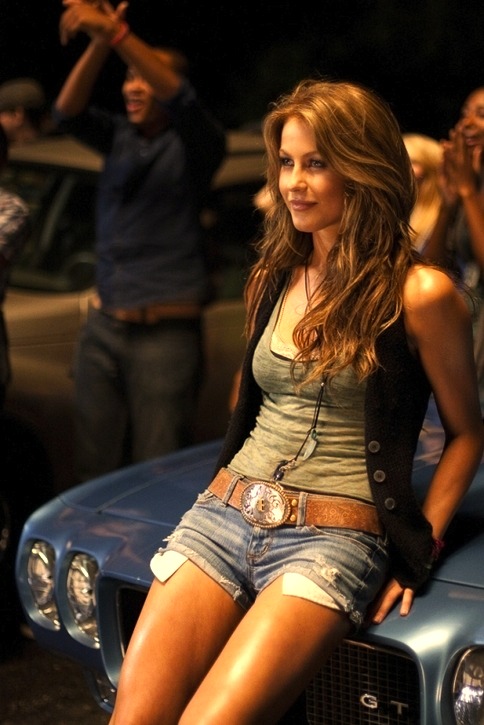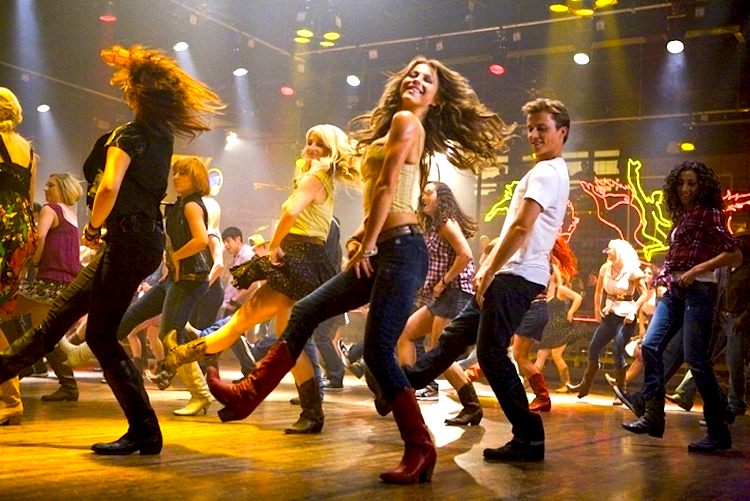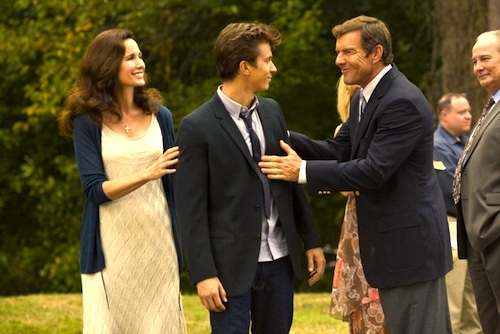
By Patricia Ducey. Director Craig Brewer of Black Snake Moan and Hustle and Flow has proven he can rock a Southern stereotype, but in his remake of Footloose, to my astonishment, he dumps every one of them into the Georgia red clay—and proves his bona fides as a skilled director. Several times in the movie theater I braced myself for that bucket of ice cold cliché to be dumped over my head, but it never happened—and that’s this movie’s triumph.
Bible-thumping preacher? No, good man laid low by grief.
Stupid Southern redneck? Nope, man-to-be who carries his self-esteem lightly, with charm to burn.
Well, surely then, Woody, the African American football captain faces racist teammates? Um, no again. We all get along just fine here in Bomont, Georgia, thank you very much.
The story opens as Boston kid Ren MacCormack (Kenny Wormald) arrives in Bomont, Georgia, taken in by his Aunt Lulu and Uncle Wes (Ray McKinnon and Kim Dickens) after his father abandons the family and his mother passes away. He soon discovers the ban on dancing and music, all due to a horrific fatal car accident three years prior when five teens went joyriding after a kegger, all explained to him by new friend Willard (Miles Teller) . . . wait, Willard? So he must be the big dumb hick then? Au contraire, Teller is the breakout star of the movie and probable new teen heartthrob. His Willard, Pitchford and Brewer’s charming and witty creation, is a delight.
On his first day at the new school, Ren locks eyes with the preacher’s daughter Ariel (Julianne Hough), who is carrying on with a race car driver bad boy, reacting against her own sorrow after brother Bobby’s death in the car crash. Complications, love triangles and spirited dancing ensue; lessons are learned. And Brewer delivers without pandering or disdain for his subject—or audience.
Yes, this movie understands and respects its audience. Brewer deepens the original’s broad caricatures into characters; we come to care about and root for even the grownups. He edits out the derisive edge exhibited in the first. Notably, Ren respects Ariel before she respects herself, like a true man would—and he learned that from his family. Footloose understands that to its teen audience a single kiss can hold greater import in their lives, as in Ren and Ariel’s, than the cynical hooking up in most other Hollywood movies aimed at their demographic.

The supporting characters are well developed as well. Uncle Wes (only a bit less scruffy as his character in Sons of Anarchy), and his wife own and work at a used car dealership, take care of their own kids and even manage to send money to Ren’s mother after his father left. They’re good people, smart and fairly successful; their business is holding fast in the recession. The parents and kids enjoy and care for each other. They take Ren in when the need arises. In short, they are not cartoons. Instead, they embody the best of the American family ethic. The townsfolk are real people: they reluctantly support the curfew and ban on dancing because they fear another horrific accident, like the one that killed the preacher’s son and four other kids. There’s no bannin’ of books or firin’ of uppity teachers as in the earlier version. Ren protests the dancing ban with respect and through proper channels (take note, Occupy Wall Street) because he respects where the town and the reverend are coming from. And yet there is no sugary aftertaste; Ren doesn’t smoke dope, because he’s a gymnast—not because he’s holier than thou. The kids chafe under the restrictions of their elders, and they demand a little freedom— along with the risk. Safety versus security—timely questions.

Which brings me to the script’s portrayal of religion. This script respects faith and Christianity. The reverend, thoughtfully portrayed by Dennis Quaid, is an intelligent and loving man who lost a son and errs mightily in his zeal to protect the other kids. His faith is regarded with respect, the Bible as a source of spiritual truth. Gone is the Church Lady vibe of the original film. Frankly, even as a non-observant Catholic, I had not realized how deeply offensive the demonization of faith in movies was until it stopped, and Brewer earns kudos for his efforts.
He has updated Dean Pitchford’s original 1984 film, keeping the timeless good bits, like the story and the witty dialogue. The bestselling ‘80s music (Footloose, Almost Paradise, I Need a Hero) is now delivered by current country and hip-hop artists, and Brewer adds a little Quiet Riot and Cee Lo Green to add spice. Julianne Hough makes the transition from Dancing with the Stars to actor well enough, but I actually missed Lori Singer’s gangly energy at times. Wormald, however, formerly a backup dancer for Justin Timberlake, waxes cool with his James Dean-do but is warm, funny and mature at the same time—and can he dance! This role seems made for him.
Footloose is a celebration: of dance, of music, self-expression and of America. And after decades enduring the self-loathing that defines so many Hollywood films, I found it a near miracle. Either Brewer intends this film to be a bridge between that fading genre (and fading box office) and a new one, or it’s a one-off, written to soften the portrayals of flyover country to sell to a wider market. Whether smart marketing or a new appreciation of Americana, it’s well worth your time and movie dollars. Brewer delivers pure entertainment, heartfelt sentiment without sentimentality–so let’s hear it for the boy!
Posted on October 17th, 2011 at 11:56am.
Wow, must say that I’m really surprised by the effort to portray real characters when Hollywood would gladly accept cardboard caricatures. Growing up, I never remember liking the original movie; I remember liking the music. When I watched it again as an adult, I found the reason I didn’t like it: none of the people in the movie were the least bit similar to anyone I knew in real life. I assumed, probably naturally, that this movie would continue those themes. I didn’t want to see it, but my daughter and wife were interested in it. Maybe I’ll join them.
Southern stereotypes are probably my biggest pet peeves in film, so I’m very happy to read this review.
Unbelievably, based on your review, it seems that the elements I saw as weaknesses in the original are polished in this one. So, as a self-proclaimed culture warrior, I may actually watch this picture one day.
Thanks for the fantastic review.
Thanks guys. I was as surprised as anyone could be. It’s true that in musicals the characters are really broad, but they did verge on the mean spirited in the original. Seeing the new one felt like coming home.